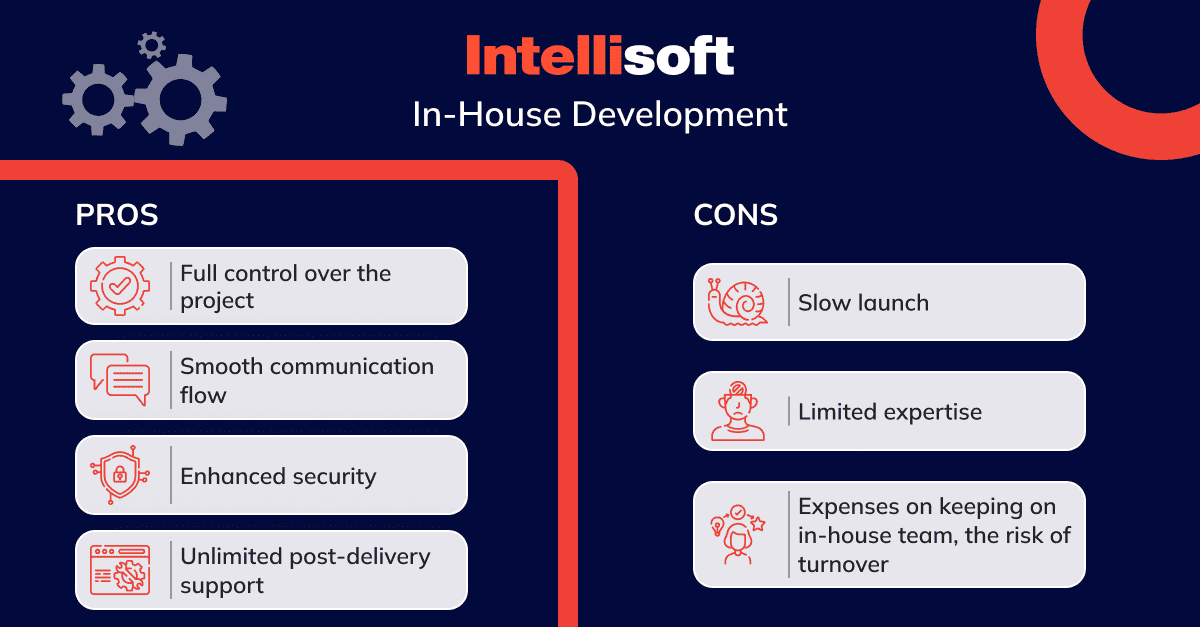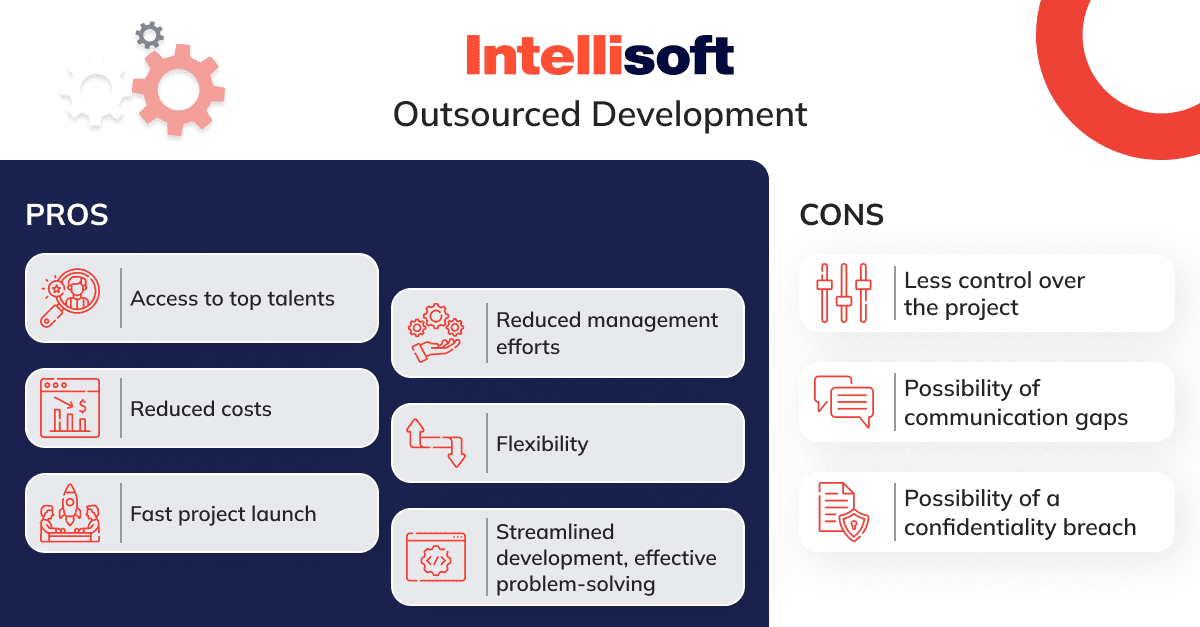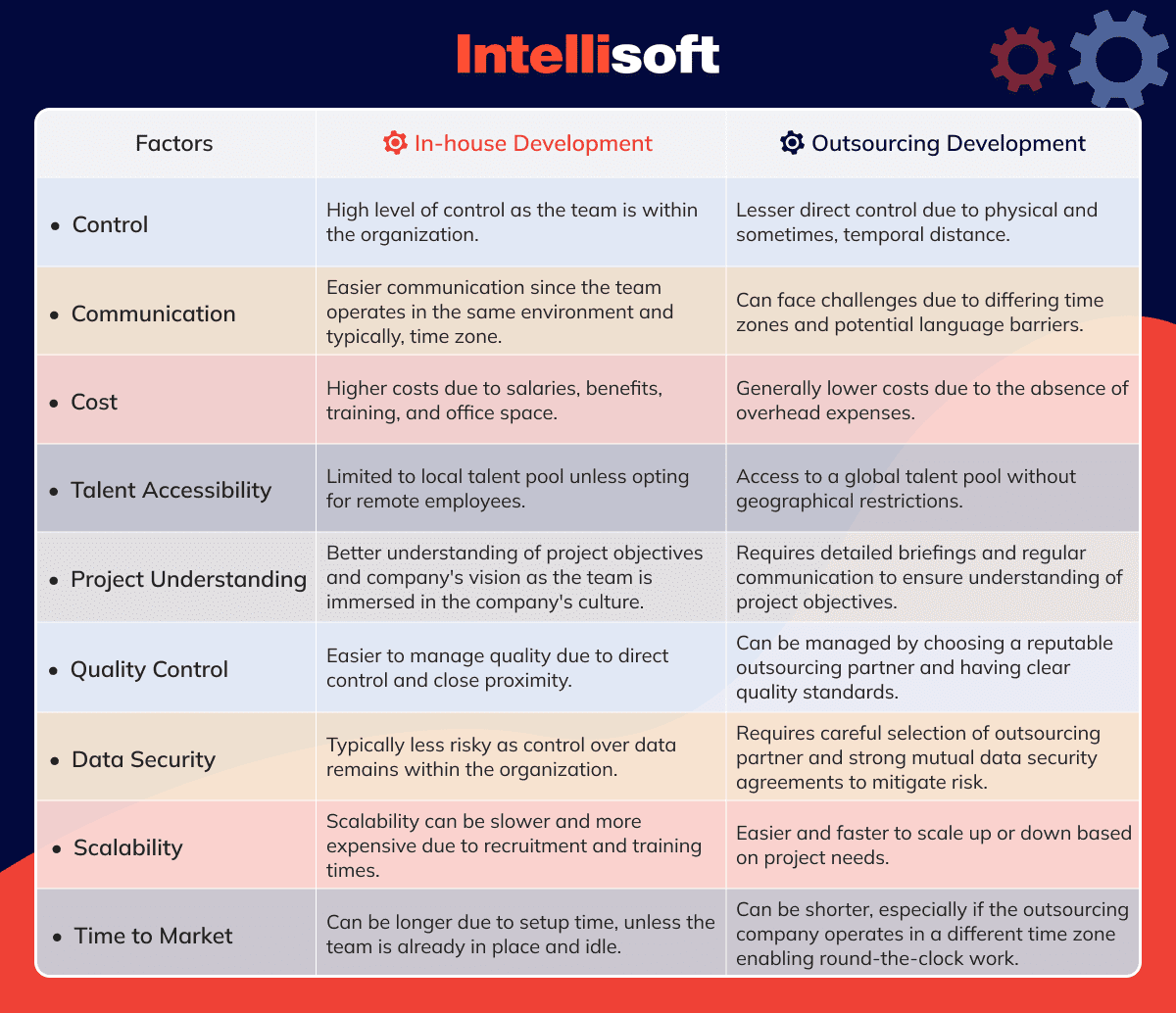Are you finding it challenging to find the right talent for your project? Torn between in-house vs outsourcing software development? Imagine you’re hosting a five-course meal for your top clients. You could go the “in-house” route:
- Spend days planning the menu
- Forage for the freshest ingredients
- Spend hours over a hot stove
- And potentially end up with a meal that’s more “Mom’s Spaghetti Night” than Michelin-star worthy.
Or, you could outsource the job to a team of professional chefs who have the skills, equipment, and knowledge to create a culinary masterpiece, leaving you free to focus on impressing your guests.
For a business owner in the software development industry, deciding between an in-house team and outsourcing can feel just as daunting. Half of executives identify talent acquisition as a significant challenge in aligning with their strategic goals. So, how do they overcome this? Many choose outsourcing to save money, attract niche specialists, and speed up time-to-market. The numbers back this up: the IT outsourcing market is expected to reach $512.50 billion in 2024, with a projected annual growth rate of 10.99%, climbing to $777.70 billion by 2028.
However, if your project is long-term and central to your business, bringing in-house development talents might be the smarter choice. Just as in the kitchen, sometimes having your team close at hand ensures the perfect execution of your vision.
At IntelliSoft, we’ve been in this “kitchen” for over a decade. Whether it’s simmering the finest mobile apps or garnishing top-notch web development projects, our seasoned experts can guide you through the tangled spaghetti of options, helping you make a choice that aligns with your business goals.
So, are you ready to cook up the perfect software development strategy for your business? Let’s dive in and explore the pros, cons, and ideal scenarios for both in house software development vs outsourcing.
Table of Contents
IT Outsourcing: Key Insights You Need to Know
As a tech startup founder, you’re probably wrestling with a critical decision: “Should I stick with in house software development vs outsourcing?” It’s not an easy choice, and there’s no universal answer that fits every situation. But here’s something worth noting—by 2024, the IT outsourcing market is expected to surge by an incredible $98 billion.

It’s evident that more businesses are leaning toward outsourcing, particularly in tech hotspots like Ukraine, Poland, and Romania. Just look at Ukraine—the IT services market there soared to $5.7 billion in 2020, more than doubling over the past five years.
But before you jump on the outsourcing bandwagon, remember that just because it’s a growing trend doesn’t automatically mean it’s the best route for your startup. There are many factors to consider before making this crucial decision. Ready to dig deeper into the nuts and bolts of in house software development vs outsourcing? Let’s break it down
What is In-House Software Development?
In-house software development is a strategic business approach where an organization builds a team internally to handle all aspects of software development. This strategy involves establishing a full-fledged, dedicated IT department within your organization that creates, maintains, and enhances software applications per your company’s requirements. It’s always ready to answer your call and gear up to handle every software bug or development issue threatening to bring problems to your business.
An in-house software development team typically consists of several roles, each more critical than the last. Your in-house software development team could comprise various roles. These typically include software engineers who craft the software code; Quality Assurance (QA) testers who ensure the product’s robustness; User Experience (User Interface (UX/UI) designers, who make the software pleasing and intuitive to use, and project managers who coordinate all these roles and maintain the project’s timeline. These are the professionals ready to answer the call whenever a software disaster strikes.
Opting for in-house software development means that you will be able to establish a dedicated team that is highly familiar with your company’s organizational culture, comprehends your ultimate goals, and has the capability to customize software solutions to meet your continually changing requirements. The choice for in-house software development often stems from a need for closer control over the project and a greater understanding of your organization’s vision, mission, and culture.
In-house development allows you to exercise direct control over your project, from inception to deployment and everything in between. You’re in the driver’s seat, navigating the landscape of software development. This route is often preferred for organizations with complex, long-term projects requiring a high degree of customization and control. An in-house team ensures that every element of your software is tailored to your needs.
However, assembling this dream team isn’t as easy as picking up a rotary phone and calling the HR department. Hiring, training, and maintaining an in-house software development team can be an enormous task, not to mention the significant financial investment it entails. Remember, talented developers don’t come cheap, especially when you’re asking for their full-time commitment.
While it may seem like a daunting task, building an in-house software development team can provide numerous benefits. A well-functioning in-house team can create software solutions that can push your business to new heights. Every business’s needs are unique, and what works well for one company may not be the right recipe for another. It’s about finding the perfect ingredients and methods to whip up your version of software success. So let’s discuss the pros and cons of an in-house team approach.

Advantages of In-House Software Development
Establishing a software development team within the company can bring forth numerous advantages. It is worth noting some of the primary benefits that come with this setup:
Direct Control
With an in-house team, you maintain control over every aspect of your software development process. You decide the team’s priorities, direct their tasks, and have a direct line of communication for immediate feedback. It’s equivalent to being the captain of your own ship, navigating through the turbulent waters of software development. This level of control facilitates quicker decision-making processes, as all stakeholders are usually in the same physical or at least in the same time zone.
Alignment with Business Culture
Having your development team within your organization ensures a better understanding of your company’s vision, goals, and culture. This alignment often translates into software that’s perfectly tailored to your business needs. It’s as if your software is an extension of your business culture, incorporating your values, expectations, and ethos.
Ease of Communication
With an in-house team, communication becomes a lot easier. There’s no need to account for different time zones, cultural nuances, or language barriers that can sometimes complicate interactions with an outsourced team. Communication is more straightforward, faster, and more effective.
Disadvantages of In-House Software Development
While the in-house approach has its benefits, it’s not without its drawbacks. Here are the key disadvantages that you need to be aware of:
High Costs
It can be costly to establish and manage a software development team within the company. The costs are not just limited to salaries but also include benefits, workspace, equipment, and training costs. Think about it: you’ll need to set aside a significant budget not only to attract top talent but also to retain them. In addition, you need to consider the expense of ongoing training to ensure your team is current with the latest technologies and trends.
Recruitment Challenges
Depending on your geographical location, it might be challenging to recruit the right talent. For instance, if you’re in a region with a shortage of tech talent, you might find it hard to hire skilled software developers. Additionally, the recruitment process itself can be time-consuming and expensive.
Slow Time to Market
With in-house development, the time to market might be longer compared to outsourcing. This longer timeline can be attributed to various factors, such as the time needed for team assembly, training, and the actual development process. In a rapidly changing tech world, this could mean missing out on being the first to market and losing potential competitive advantage.
Deciding whether to go with in-house software development ultimately depends on your specific needs, resources, and long-term goals. It’s crucial to weigh these advantages and disadvantages before making a decision between in house software development vs outsourcing. In the end, the main objective is to select a course of action that increases your likelihood of success and is in line with your business strategy and goals.
Related readings:
- What Is Nearshore Outsourcing in Software Development?
- Remote Development Team Structure in a Nutshell
- Make Your Projects Successful: Tips for Building a Powerful Project Team Structure
- A Guide on How to Recruit Software Developers: Outsource Coders vs. Freelancers
- Team Extension vs Dedicated Development Team: Making the Right Choice
Exploring Outsourcing Software Development
Outsourcing software development is an alternate route to achieving your company’s tech needs, quite different from the in-house approach we just discussed. Rather than hiring employees and developing software internally, outsourcing involves hiring an external agency or outsourcing software development company to handle your software development needs. These external resources could be located anywhere in the world, removing the geographical constraints often associated with in-house teams.
To understand outsourcing better, think of it as a strategic partnership with an external entity. In this case, that entity is a tech company or a group of freelancers with specialized skills in software development. This outside partner is responsible for managing your software project and collaborates closely with you to comprehend your requirements and provide a solution that fulfills your goals.
One key characteristic of outsourcing is that the team operates outside of your company, often in a different geographical location, sometimes even in a different time zone. These teams can be across the country or on the other side of the globe. This global reach gives you access to a vast pool of talent unrestricted by the limitations of your local job market.
For instance, you might find a group of software developers with niche expertise in a specific technology in Eastern Europe or a team of seasoned coders with decades of experience in Silicon Valley. By outsourcing, you tap into this global network of talent, bringing a wealth of experience, knowledge, and innovative thinking to your project.
Outsourcing is not a one-size-fits-all approach. It comes in various forms, each with its unique characteristics. Some businesses opt for project-based outsourcing, handing over an entire project to an external agency. Others may choose staff augmentation, where the external agency provides specialized staff who work under the business’s management. There’s also the dedicated team model, where the outsourcing agency provides a team that exclusively works on the business’s projects.
Outsourcing software development can be an efficient solution, especially for businesses that lack the internal capabilities or resources to execute a software project. For companies looking to concentrate on their main business operations, outsourcing software development to external professionals can be a wise strategic decision.
However, like the in-house approach, outsourcing also has its unique set of advantages and disadvantages. These pros and cons can significantly influence your decision to outsource or not. As we dig deeper into these aspects, we’ll try to explain how outsourcing software development can help you achieve your business goals.

Advantages of Outsourcing Software Development
The benefits of outsourcing software development can be transformative for businesses. Here are some of the key advantages:
Cost Efficiency
Many businesses opt for outsourcing primarily due to the possibility of attaining significant cost savings. Outsourcing enables you to avoid overhead expenses associated with maintaining an in-house team, such as salaries, benefits, workspace costs, and training expenses. You pay only for the services you need, leading to more efficient budget utilization.
Access to a Global Talent Pool
Outsourcing breaks down geographical barriers, giving you access to a larger talent pool. Whether you need a specialist in a niche technology or an expert in a particular industry, outsourcing can connect you with the right professionals, irrespective of their geographical location.
Flexibility
Outsourcing provides flexibility, allowing you to ramp up or down the team size based on project needs. You can bring in additional resources during peak times and scale down when necessary, ensuring optimal productivity and cost efficiency.
H3: Disadvantages of Outsourcing Software Development
Despite its many benefits, outsourcing isn’t without potential downsides. Here are some of the key challenges:
Communication Issues
With teams often operating across different time zones and possibly speaking different languages, there can be potential communication issues. Cultural differences may also pose challenges in conveying expectations and feedback.
Quality Control
While there are many highly skilled outsourcing providers, concerns about quality control can arise. It can be harder to oversee the project’s quality when the team is not physically present in your office.
Data Security Risks
When a company outsources, it must share sensitive information with an external party. This sharing of information can create potential risks for data security. Protecting your intellectual property is crucial, and you need to ensure that the outsourcing provider has robust security measures in place.
At IntelliSoft, we acknowledge these risks and have set up stringent measures to mitigate them. Our dedication to clear and timely communication keeps our clients in the loop at all stages of the project, minimizing any potential misunderstandings. We maintain a relentless commitment to quality, ensuring our output meets the highest standards. As for data security, we uphold strict security protocols, sign NDAs, and safeguard our clients’ sensitive information at all times.
Outsourcing software development comes with both potential risks and substantial rewards. It’s essential to choose a reliable outsourcing partner like IntelliSoft, which is aware of these challenges and is dedicated to offering solutions that ensure smooth, efficient, and secure project execution. By weighing these factors, you can determine if outsourcing software development is suitable for your organization’s requirements.
In-house Software Development vs. Outsourcing: Factors to Consider
When making the in-house vs. outsourcing software development decision, it’s not about determining which approach is universally better. Instead, it’s about identifying which method aligns best with your unique business requirements, goals, and circumstances. To that end, there are several factors you should consider to help you make the right decision:

Project Complexity and Size
The size and complexity of your project are critical factors when determining whether to opt for in-house development or outsourcing. These factors can significantly impact your project’s requirements in terms of resources, expertise, and time.
Larger, More Complex Projects
When you’re dealing with a large and complex project, an in-house team may be more beneficial. Having a dedicated team within your company allows for more efficient communication and oversight. This efficiency is particularly vital when the project involves numerous intricate components that require close collaboration and consistent coordination among team members.
A comprehensive understanding of your business’s internal operations and goals can also be advantageous in effectively managing complex projects. An in-house team, already familiar with your business culture and objectives, can leverage this understanding to drive the project forward and help you reach the desired outcomes faster.
Smaller Projects or One-off Tasks
Conversely, smaller projects or one-off tasks might be better suited for outsourcing. For such projects, hiring an external team can be a more cost-effective and efficient solution. It allows you to find suitable professionals in a global pool of talent and expertise without committing to the long-term costs associated with hiring and maintaining an in-house team. You also gain the flexibility to scale the team based on the project’s specific requirements.
Budget Constraints
Determining whether to select in-house software development vs outsourcing depends on your budget. It is an important factor to consider in this decision-making process. The financial implications of these two approaches can vary significantly.
Cost Advantages of Outsourcing
Outsourcing often helps save a significant amount of money, making it an attractive option for startups or smaller businesses operating within budget constraints. When you outsource, you eliminate the overhead costs associated with maintaining an in-house team, such as salaries, benefits, and office space with all the equipment and infrastructure. You pay solely for the services you need when you need them, providing a level of flexibility that can be highly beneficial for managing costs.
However, while outsourcing can offer short-term cost savings, don’t forget to consider the long-term implications. As your project expands or continues over an extended period, the economic benefits of outsourcing may diminish. It’s crucial to conduct a thorough cost-benefit analysis before making a decision.
Quality Control
Quality control is a critical aspect of any software development project. The level of control you have over the project’s quality can significantly influence the end result. Here’s how quality control factors into the in-house vs. outsource debate:
In-house Teams
With an in-house team, you often have better control over project quality. This control stems from the fact that your team is within arm’s reach, figuratively speaking. You can directly manage, supervise, and provide immediate feedback to your team, thereby ensuring that the project aligns with your quality standards at every stage. You have greater involvement in the entire process, starting from the initial design phase to the final stage of testing and deployment. This hands-on approach can be instrumental in producing high-quality software that meets your specific needs.
Outsourced Teams
Outsourcing does not necessarily mean compromising on quality. If you choose to outsource your project to a reputable agency with a proven track record, you can still achieve excellent results. A high-quality outsourcing provider, such as IntelliSoft, will adhere to the best industry practices and standards, ensuring that the quality of the work is not compromised. It’s also important to establish clear communication channels and regular check-ins to stay updated on the project’s progress and ensure that it meets your quality expectations.
Time Constraints
Time constraints are a reality of most software development projects. Whether you’re racing against a tight deadline or need to get your product to market before your competitors, how you manage your time can make all the difference. Here’s where in-house and outsourcing stand in terms of time management:
In-house Teams
While having an in-house team gives you greater control, it can sometimes lead to longer development times. This could be due to various reasons, from the initial time investment required to assemble and train the team to potential bottlenecks in the development process.
Outsourced Teams
If your project has a tight deadline, outsourcing can offer a significant advantage. By outsourcing to agencies that operate in different time zones, you can enable around-the-clock work on your project, thereby reducing the time to market. Also, outsourcing companies often have a ready pool of experts who can start working on your project immediately, eliminating the time spent on hiring and training a new team.
Choosing between in-house and outsourcing for your software development needs requires a thorough understanding of your project’s requirements and your organization’s capacities and constraints. The choice should be driven by factors such as project complexity, budget, quality control, and time constraints. It’s all about striking a balance and finding the approach that fits best with your unique circumstances and business goals. Ultimately, the right decision between in house software development vs outsourcing is the one that enables you to deliver high-quality software that drives your business forward.
Conclusion
So, let’s say you’ve now served your five-course meal, your guests are pleasantly full, and the feedback is overwhelmingly positive. You’ve navigated through the complexities of sourcing, preparing, and presenting the perfect feast thanks to making all the right decisions. In the same way, you need to weigh all pros and cons when deciding between in house versus outsourcing software development.
Just as every ingredient, technique, and presentation style plays a role in creating the perfect culinary experience, so too does every aspect of software development play a role in achieving your business goals. You need to consider project complexity, budget, quality control, time constraints, and many other factors to make an informed decision. In the challenging landscape of the digital era, the decision between in-house vs. outsourcing software development is a crucial one, significantly influencing a company’s ability to innovate, compete, and succeed in its respective market.
Whether you choose in-house development or outsourcing, remember that the ultimate goal is to deliver high-quality, impactful software solutions that cater to your business needs and drive your success. Sometimes, you may need a dedicated team to cook up solutions in your kitchen, while at other times, an external gourmet chef might be the best way to impress your guests.
How IntelliSoft Can Help?
According to a McKinsey study, a striking 87% of businesses are currently grappling with IT team recruitment or expect to face difficulties soon. If your business is in that situation, outsourcing could be your winning strategy—and we’re here to help you make it a reality. This is where IntelliSoft steps in. We understand the recipe for success in software development, having served numerous satisfied clients over the years. We are here to provide the expertise and resources you need, irrespective of your choice between in-house vs outsourcing software development.
At IntelliSoft, we offer a range of services from mobile and web development, product design, QA & testing to AI & ML and IT support. We can even supplement your existing teams with our experts to ensure your software projects are a success. Our experienced professionals, armed with state-of-the-art technology, are always ready to help you, whether you need a full-scale development project or a single, one-off task.
With IntelliSoft, you’re not just outsourcing your software development – you’re entering a partnership built on trust, transparency, and a shared passion for delivering top-notch software solutions. So why not reach out to us? Let’s prepare that five-star software feast your business deserves.
To learn more about how IntelliSoft can assist you with your software development needs, follow the link. We look forward to partnering with you on your journey to success!










